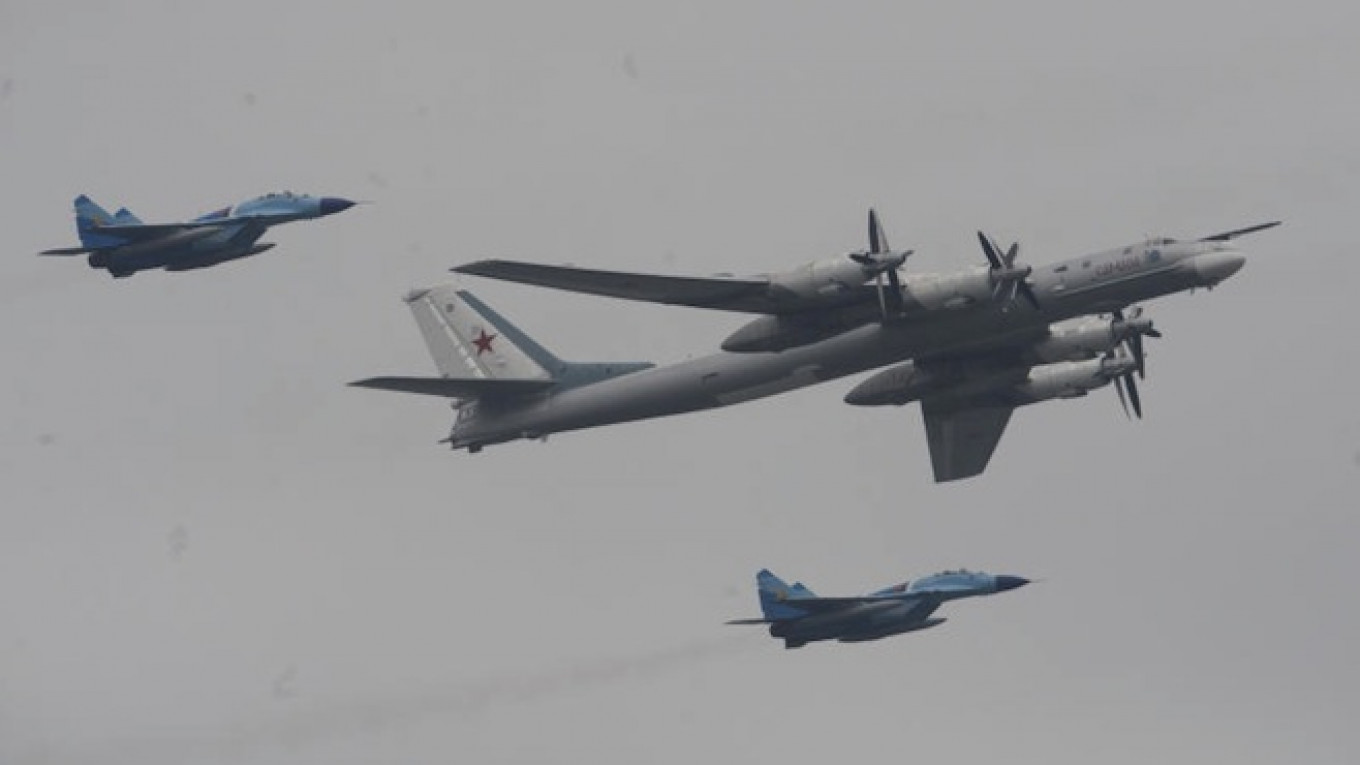Concern is growing in NATO over Russia's nuclear strategy and indications that Russian military planners may be lowering the threshold for using nuclear weapons in any conflict, alliance diplomats say.
NATO officials have drawn up an analysis of Russian nuclear strategy that will be discussed by alliance defense ministers at a meeting in Brussels on Thursday.
The study comes amid high tension between NATO and Russia over the Ukraine conflict and rising suspicions on both sides that risk plunging Europe back into a Cold War-style confrontation.
Western concerns have also been fueled by increasingly aggressive Russian air and sea patrolling close to NATO's borders, such as two Russian "Bear" nuclear-capable bombers that flew over the English Channel last week.
The threat of nuclear war that once hung over the world has eased since the Cold War amid sharp reductions in warheads but Russia and the United States, NATO's main military power, retain massively destructive nuclear arsenals.
Russia's nuclear strategy appears to point to a lowering of the threshold for using nuclear weapons in any conflict, NATO diplomats say.
"What worries us most in this strategy is the modernization of the Russian nuclear forces, the increase in the level of training of those forces and the possible combination between conventional actions and the use of nuclear forces, including possibly in the framework of a hybrid war," one diplomat said.
Russia's use of hybrid warfare in Ukraine, combining elements such as unmarked soldiers, disinformation and cyber attacks, has led NATO's military planners to review their strategies for dealing with Russia.
All the NATO countries, except France which is not a member, will meet on Thursday as part of NATO's Nuclear Planning Group, which NATO officials describe as a routine meeting focusing on the safety and effectiveness of NATO's nuclear deterrent.
Implications
But all 28 ministers, including U.S. Defense Secretary Chuck Hagel, will have a broader discussion of Russia's nuclear strategy over lunch. No immediate action is expected from NATO's side.
Ministers are likely to ask officials to look into the implications of Russia's nuclear strategy for the alliance, and only then could there be any consideration of whether any changes were needed to NATO's nuclear posture.
At a time of heightened tension with the West, Russia has not been shy about reasserting its status as a nuclear power.
President Vladimir Putin pointedly noted last August that Russia was a leading nuclear power when he advised potential enemies: "It's best not to mess with us."
A report by the U.S. Congressional Research Service last year said Russia "seems to have increased its reliance on nuclear weapons in its national security concept."
Russia has embarked on a multibillion-dollar military modernization program and Russia's top general, Valery Gerasimov, said last week that support for Russia's strategic nuclear forces combined with improvements in conventional forces would ensure that the United States and NATO did not gain military superiority.
He said the Russian military would receive more than 50 new intercontinental nuclear missiles this year.
In December, Putin signed a new military doctrine, naming NATO expansion as a key risk. Before the new doctrine was agreed, there had been some calls from the military to restore to the doctrine a line about the right to a first nuclear strike.
Doctrine
This was not included in the new doctrine, however, which says Russia reserves the right to use nuclear weapons in response to a nuclear strike or a conventional attack that endangered the state's existence.
NATO's 2010 "strategic concept" says deterrence, "based on an appropriate mix of nuclear and conventional capabilities, remains a core element of our overall strategy."
Washington and Moscow have traded accusations that the other has violated a Cold War-era arms control agreement.
The United States accuses Moscow of violating the 1987 Intermediate-Range Nuclear Forces treaty by testing a ground-launched cruise missile. Russia argues that Washington's use of drones and other intermediate-range arms amounts to a violation of the treaty.
A senior NATO official said Russia's Zapad exercise in 2013 was "supposed to be a counter-terrorism exercise but it involved the [simulated] use of nuclear weapons."
The Arms Control Association (ACA), a Washington-based advocacy group, estimates Russia has about 1,512 strategic, or long-range, nuclear warheads, a further 1,000 non-deployed strategic warheads and about 2,000 tactical nuclear warheads.
A Message from The Moscow Times:
Dear readers,
We are facing unprecedented challenges. Russia's Prosecutor General's Office has designated The Moscow Times as an "undesirable" organization, criminalizing our work and putting our staff at risk of prosecution. This follows our earlier unjust labeling as a "foreign agent."
These actions are direct attempts to silence independent journalism in Russia. The authorities claim our work "discredits the decisions of the Russian leadership." We see things differently: we strive to provide accurate, unbiased reporting on Russia.
We, the journalists of The Moscow Times, refuse to be silenced. But to continue our work, we need your help.
Your support, no matter how small, makes a world of difference. If you can, please support us monthly starting from just $2. It's quick to set up, and every contribution makes a significant impact.
By supporting The Moscow Times, you're defending open, independent journalism in the face of repression. Thank you for standing with us.
Remind me later.






